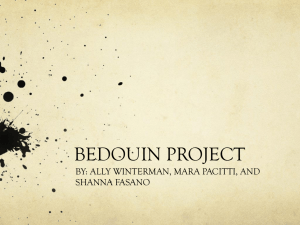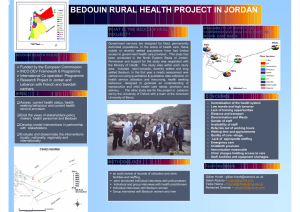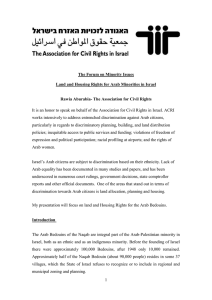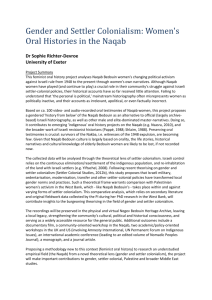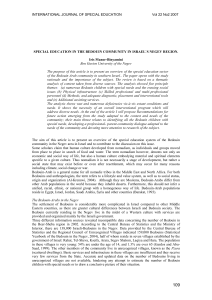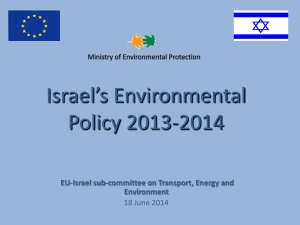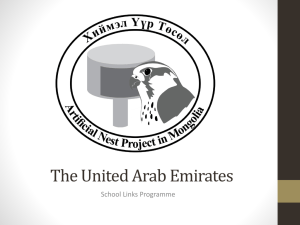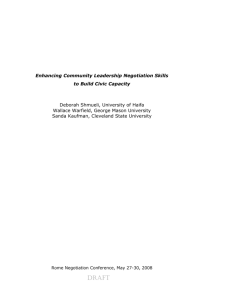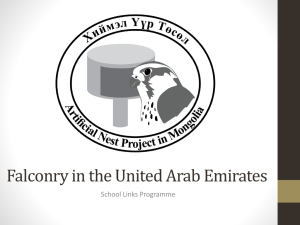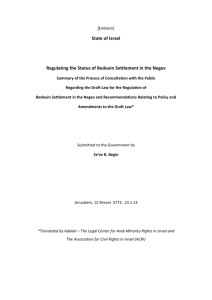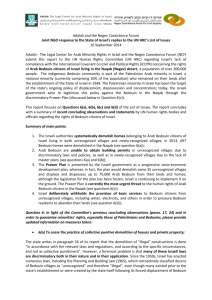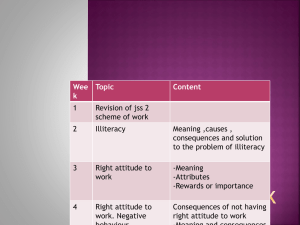SIDREH - Office of the High Commissioner on Human Rights
advertisement
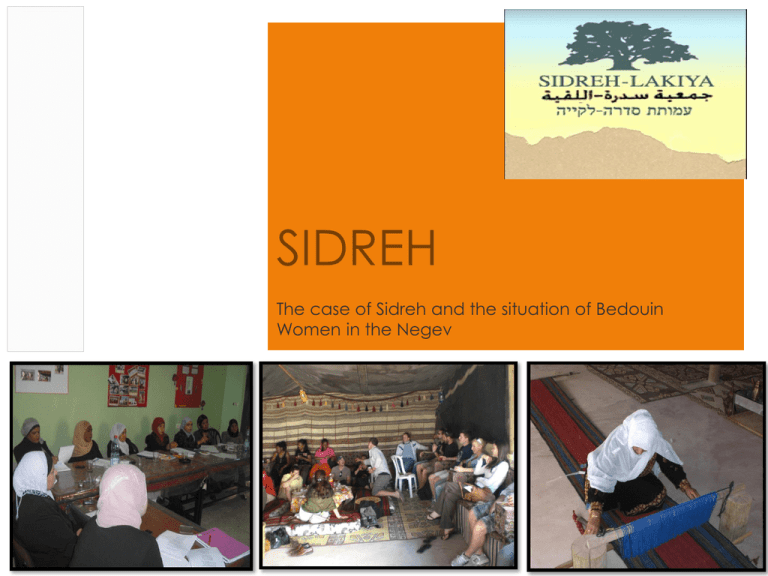
SIDREH The case of Sidreh and the situation of Bedouin Women in the Negev The Bedouin population of the Negev Desert suffers from harsh socio-economic conditions There are almost 190,000 Bedouin people in the Negev Desert, making more than 25% of its population. However, they control less than 3% of the area. They are organized as follows 1.Permanent settlements (7) • Urban Settlements with a total population of about 100,000 • Among the largest concentrations of poverty and unemployment in Israel • About 77% of Rahat’s residents (the largest Bedouin city in Israel) are supported by National Insurance Institute allowances. •The rates of crime and drug use among the Bedouins in the Negev are constantly increasing and the offenders’ age is constantly decreasing. •Over 60% are children under the age of 17, while the elderly population (over 65) constitutes no more than 1.5% •Its growth rate of 5% a year is one of the highest in the world. 2. Unrecognized settlements (55) • More than 40,000 people • Not considered legal settlements by the Israeli Government • Subject to demolition by the authorities • Ineligible for basic municipal services such as connection to the electrical grid, water mains or garbage services • Between 8 – 10 are in the process of being recognized Bedouin Women are one of the most vulnerable groups as a result of the difficult external conditions, as well as the harsh patriarchal tradition within the community General situation of Bedouin Women in the Negev • Only 6.3% of Arab-Bedouin women have an academic degree according to the numbers from 2007. • Only one woman was elected to the Israeli Parliament (Knesset) by an Arab party over the last sixty years, since state independence. • There are no women in a position of leadership in the local government • 90% of the Bedouin women are unemployed • Women are confined to the domestic and private domain and traditions such as polygamy are still common (in 2007, only 18.9% of Bedouin women worked outside the home, compared with 78.9% of Jewish women). • Highest illiteracy rate in Israel (between the ages 55-64, the illiteracy rate reaches 35%, and above that age it reaches 68%). The accelerated modernization and urbanization process threatens Bedouin’s traditional way of life and livelihood, and causes a continuous marginalization Main issues affecting the Bedouin Community and its Women Accelerated modernization and urbanization processes threatens Bedouin’s traditional way of life and livelihood High Illiteracy Rates Poor Access to Health Services Harsh Patriarchal traditions and conservatism Lack of organized community efforts and Internal Tribal conflicts Limited economic development Geographically remote Poor transportation Lack of trained human resources There are several strategies that could be implemented on a government level to improve the situation Major Recommendations – Government Level Increase access to Health Services with a focus on women Provision of sustainable of basic infrastructural services such as electricity and water supply to health services. Increase logistical access to health services by constructing roads Support grassroots NGOs in joint efforts to combat illiteracy Increase access to early childhood education for young boys and girls in villages Increase access to high school education by adding high school classrooms at the elementary schools in villages or build high schools in the villages. Provide vocational training targeting women 40+ years. Women have demanded training in areas of work including hairdressing, general and bridal clothing design. Support organizations engaged in enhancing opportunities for the preservation of its cultural heritage and traditional crafts such as weaving and spinning. Sidreh is a nonprofit organization established in 1998 to empower, represent and improve the socio-economic situation of Bedouin women in Negev Goals Women Empowerment & Representation Improve women’s employment opportunities and economic development Overcome the various types of illiteracy, ensuring access to continuing education for adult women Increase woman's visibility, equality and participation in all aspects of community life, while improving their self confidence and leadership skills Represent Bedouin women in different national and international scenarios, while enhancing their capacity to advocate for their rights Sidreh seeks to enable Bedouin women to become independent and active members of their community Mission Vision Support the Arab women in the Negev in their pursuit of the full realization of themselves and of their rights, as well as of those of their own community Arab women in the Negev will have full ownership over themselves and their decisions. They will fully benefit from their rights, while enjoying safety and stability. They will be active members in their society, always proud of their cultural heritage Sidreh seeks to provide integral services in order to empower local women and generate prosperity in the communities Areas of Intervention Economic Development Education • Literacy and high school completion • Empowerment and Civil Education (health, environment, maternity, rights, etc) • Educational Models & curriculum Social Empowerment & Community Development • Weaving project as source of income and empowerment • Develop/support other local entrepreneurial endeavors • Women leadership training and promotion • Communtiy reselinece and emergency respons projects • Women in the Media • Strengthen Alternative Tourism in the region Advocacy and Awarness Strategies Lakiya negev weaving Sidreh is one of the Negev's leading NGO’s, and the first organization of its kind to promote a sustainable income generating project by transforming women’s traditional weaving skills into a professional manufacturing business that empowers women both socially and economically. Over 100 women participate in the production of rugs, bags and pillow cases; from spinning, dyeing, twining, weaving and quality control, as a unique process that is hardly seen anywhere else in the world. Sidreh has a successful and widely recognized track record of more than ten years of experience Major Achievements Sidreh developed a successful model that empowers women, by becoming local leaders and advocators of their own rights. This model has proved effective in working with challenging communities, while gaining support from local organizations. More than 1,400 adult women can read and write thanks to our literacy program More than 60 adult women have completed high school and Israeli university preparation exams (bagrut) through our Adult Education Program. More than 1,600 women have participated in our leadership and rights (Education, Health, Housing and Employment) awareness programs. Sidreh is the only organization that works with the communities of the “unrecognized villages”, which present alarming needs and high levels of vulnerabilities Built the first Women’s Center in an Unrecognized Village, and supported the consolidation of local Women’s Committee, which develops activities for more than 90 women. This was the first time that men were also involved in a women association, creating a sense of trust and harmony between men and women. Developed the first women’s newspaper in the Negev, with 11,000 copies per month; distributed to more than 50 villages. Represented Bedouin women in various scenarios, participating in the Palestinian Women’s Network, and CEDAW’s regional meetings in Cyprus and New York, among others. “Lakiya Negev Weaving” is close to become 100% self-sustainable. Many fair-trade retailers around the world are already recognizing its quality and design as one of the best in the region, and it has surpassed the stringent quality rules required by Western buyers. For more information please contact us at: sidreh@gmail.com Or visit our website: www.lakiya.org
